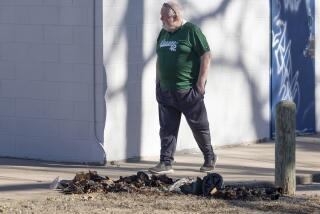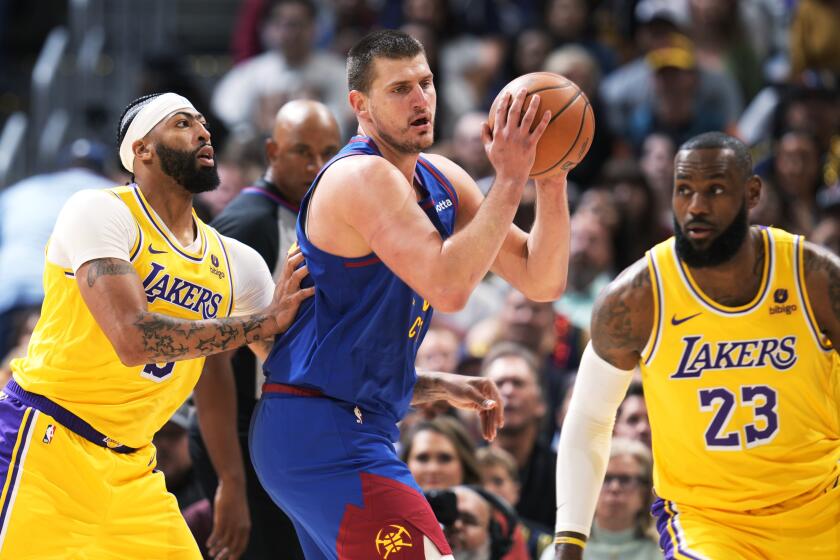As Jackie Robinson was making history, Wendell Smith wrote it
Baseball’s greatest story will be rewritten again Monday as the sport celebrates the 66th anniversary of Jackie Robinson’s breaking the major leagues’ color barrier.
Yet the man who wrote the story will be forgotten.
In every game, players from every team will wear 42, the number on the back of Robinson’s jersey when he debuted for the Brooklyn Dodgers on April 15, 1947.
Yet nobody will sit in the stands with a manual typewriter atop their knees in memory of the man who, even as he wrote about integration on the field, was barred from the press box because he was black.
Nobody will honor the man who endured the same prejudice as Robinson as he fought that prejudice with his words. Nobody will remember the man whose hidden fight became an inspiration for Robinson’s public battle.
Everyone will remember the headline, but few will remember the byline — Wendell Smith.
The humble, bespectacled journalist was Robinson’s chronicler, his confidant, and sometimes even his conscience. As sports editor and columnist for the African American-owned Pittsburgh Courier, Smith accompanied Robinson throughout his first major league season, creating his image, reporting his words and crusading for his rights.
As Robinson grew more popular, Smith became more invisible, until he eventually became Robinson’s ghost writer in the literal sense, the memory of him turning ethereal and nearly vanishing altogether.
“Everywhere we went, Wendell Smith was there,” said Don Newcombe, former Dodgers pitcher, who was Robinson’s longtime teammate, friend and fellow pioneer. “He was instrumental in so many things that happened, he should not be forgotten.”
The movie “42,” which opened Friday and chronicles Robinson’s entry into the major leagues, is the rare piece of work that illuminates Smith’s role in Robinson’s life. Smith is the first voice heard in the movie, and his presence as Robinson’s guide and companion is visible throughout. It was so startling to see Smith’s image resurrected that, when the character first appeared on the screen, Newcombe nudged his wife Karen and said his name out loud.
“I was so happy and surprised to see him up there,” Newcombe said.
That it took 66 years for Smith to be appropriately recognized is, sadly, not surprising.
Although he was the only baseball writer assigned strictly to follow Robinson, he wasn’t even allowed into the Baseball Writers Assn. of America until Robinson’s second season. Although Robinson often cited Smith for his contributions to baseball’s desegregation, he wasn’t inducted into the writer’s wing of the Baseball Hall of Fame until 1994, 22 years after his death.
Yet even today, Smith’s 91-year-old widow, Wyonella, follows the advice that her husband often gave Robinson as the two men traveled through the baseball world battling ignorance.
“If I complained about anything, Wendell would be turning over in his grave,” she said from a Chicago retirement home. “Like he would tell Jackie, you can get angry as heck, but you don’t take anything as an insult, because you know who you are.”
In the best tradition of old-school journalists, Smith was not only a writer, but a fighter. He found his cause in 1931, at age 17, when he was a pitcher for a Detroit American Legion team and his catcher was close friend Mike Tresh. One day, with major league scouts watching, they combined on a 1-0 victory. Afterward, a scout signed Tresh, not Smith. His explanation? Tresh was white and Smith was not.
Tresh enjoyed a 12-year career with the Chicago White Sox and Cleveland Indians. Smith headed off to West Virginia State College to become a sportswriter whose career was based on righting that injustice.
“Wendell decided that day that if he was going to do anything in his life, he was going to make sure blacks played in the major leagues,” Wyonella said.
Once Smith began covering the Negro Leagues for the nationally circulated Courier in 1937, he had his platform to make a difference. About that time, Robinson was at UCLA and became the first athlete to letter in four sports at the school.
In 1945, it was Smith who accompanied Robinson, then a shortstop with the Kansas City Monarchs, to a group tryout with the Boston Red Sox. When that proved to be a publicity stunt, Smith traveled to Brooklyn to personally alert Dodgers general manager Branch Rickey about Robinson’s potential as a groundbreaker.
“Wendell is the one who got the ball rolling on the whole thing,” Newcombe said. “He’s the one who recommended Jackie to Mr. Rickey.”
This recommendation, followed by positive scouting reports, led to Robinson’s being summoned to Brooklyn for a meeting with Rickey. Responding to Rickey’s questions about whether he could stay calm in the face of harassment, Robinson asked, “Are you looking for a Negro who is afraid to fight back?” Rickey replied that he needed a player “with guts enough not to fight back.”
Once Rickey signed Robinson, he also signed Smith, at $50 a week, to accompany him for a year with the Dodgers’ triple-A team in Montreal, then for his 1947 debut season with the Dodgers. That promise Robinson had made to Rickey was enforced by Smith, who constantly reminded Robinson of his importance to the community and the cause.
“They became great card-playing partners,” Newcombe said. “Jackie needed somebody he could trust, and Wendell was there.”
Their relationship was tested early when Rickey ordered Smith to drive Robinson out of Montreal’s Sanford, Fla., training camp because of threats. Robinson didn’t want to leave but Smith refused to leave without him. Robinson gave in, and a bond was slowly forged.
At the time, many white reporters were, like many of their readers, skeptical of Robinson and other black players. So Robinson trusted his most important words to Smith, who often was joined in his coverage by another future Hall of Fame columnist, Sam Lacy of the Baltimore Afro-American.
“It’s not that we wouldn’t want to talk to white reporters, but some of them weren’t real particular about wanting us there,” Newcombe said. “Anything important that Jackie had to say, he wanted to say it to the black newspapers and Wendell.”
In turn, Smith often would advise Robinson about the questions white America would be asking, and how to respond to them. When Robinson wanted to fight back verbally, Smith preached calm.
“Wendell would always say, if you flared up, nothing good would come of it,” Wyonella said. “When Mr. Rickey would worry that Jackie would be too hot tempered, Wendell would always say, “No, no, he’ll be just fine.”’
Smith would become angry only when Robinson refused his help, at which point Smith would remind the star that he was enduring the same racial slights, only without the stardom.
“We would see Wendell sitting up there in the black bleachers typing his story. They wouldn’t even let him in the press box, it was worse than you could ever imagine,” Newcombe said. “Everything we went through, Wendell went through the same thing.”
After Robinson became an established major leaguer, Smith moved to Chicago, where he became the first black reporter for the Chicago Herald-American and later became a WGN-television sports anchor while writing a column for the Chicago Sun-Times.
It was at the Herald-American in 1961 that Smith wrote a series of articles about the continued segregation of black baseball players in Florida during spring training. It wasn’t long before all baseball players were allowed to share the same hotels and restaurants during their training.
“Everyone said he should have won a Pulitzer Prize for that series, but there was no way they were going to give it to him,” Wyonella said. “He didn’t care. He just kept pushing.”
Despite his impact, Smith carried little public celebrity. Brian Helgeland, the director and writer of “42,” had never heard of him when he began his research.
“But his name kept showing up in all these stories, and it became apparent he was a big part of everything,” Helgeland said.
On Oct. 24, 1972, Robinson died of a heart attack at 53.
Almost exactly one month later, on Nov. 26, 1972, Smith died of pancreatic cancer at 58.
“Even in the end, they were together,” Wyonella said.
Smith was too sick to attend Robinson’s funeral, but from his hospital bed, he wrote Robinson’s obituary.
“He never backed down from a fight, never quit agitating for equality,” Smith wrote about his friend in words that could have described himself.
In a career filled with prose that changed the world, it was one of Wendell Smith’s best stories.
It was also his last.
Twitter: @BillPlaschke
More to Read
Get our high school sports newsletter
Prep Rally is devoted to the SoCal high school sports experience, bringing you scores, stories and a behind-the-scenes look at what makes prep sports so popular.
You may occasionally receive promotional content from the Los Angeles Times.







